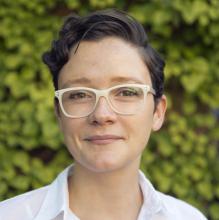CSDE Fellows Invited Lectures
Fellow Host: Brianna Mills

Discerning Risk: How Cardiometabolic Macro-trends Make Well-being Invisible in Samoa
Jessica Hardin, Anthropology, Pacific University
03/31/2017
12:30-1:30 PM PT
The Samoan islands face unpredicted rates of cardiometabolic disorders, including diabetes, heart disease, obesity, and hypertension. The Pacific Islands more generally have become the focus of sophisticated and historically significant research about what scholars have called the nutrition or epidemiological transition. Research on these disorders in the islands, tend to focus on three main factors that influence health behaviors: wealth increases in the region; fat positivity; and changes in labor patterns leading to decreased physical activity. Indeed, macro-level changes related to urbanization, migration and a changing food environment have all contributed to population-wide rates of cardiometabolic disorders. However, these trends don’t explain the daily struggles that people face when the materials that once indexed wellness, like food and fat, can now also index sickness. Instead of straightforward valorizations of food and fat, as literature on the epidemiological transition might suggest, I saw ambivalence and anxiety about reciprocity and hierarchy communicated through discussions of these materials. Ambiguity around the meaning of health is often left out of the discussion of the emergence of cardiometabolic disorders worldwide but is essential to understanding the rise of these disorders and effective methods for preventing them. In this talk, I parse out three enduring contradictions that show that discerning cardiometabolic risk a social process of interpreting bodies and relationships: to be wealthy and poor places you are risk; foods that have historically created well-being, now place individuals at risk for developing cardiometabolic disorders; and fat can mean both power, generosity, and generativity and potentially laziness, sickness, and moral corruption.
Jessica Hardin is Assistant Professor of Anthropology at Pacific University. She is a cultural and medical anthropologist who is interested in how the intersection of medicine and religion shapes lived experiences of chronic illness. As an ethnographer, her work focuses on metabolic disorders to bridge critical medical anthropology (on nutrition, fat, metabolic disorders) and the anthropology of Christianity (on the body, healing, denomination).
Schedule a meeting with the Speaker
The Fellow Host, Brianna Mills, is a PhD candidate in Epidemiology. Her work is focused on identifying risk markers for firearm injury using probabilistic linkage of medical and criminal records, and neighborhood characteristics. Brianna and Dr. Hardin ar